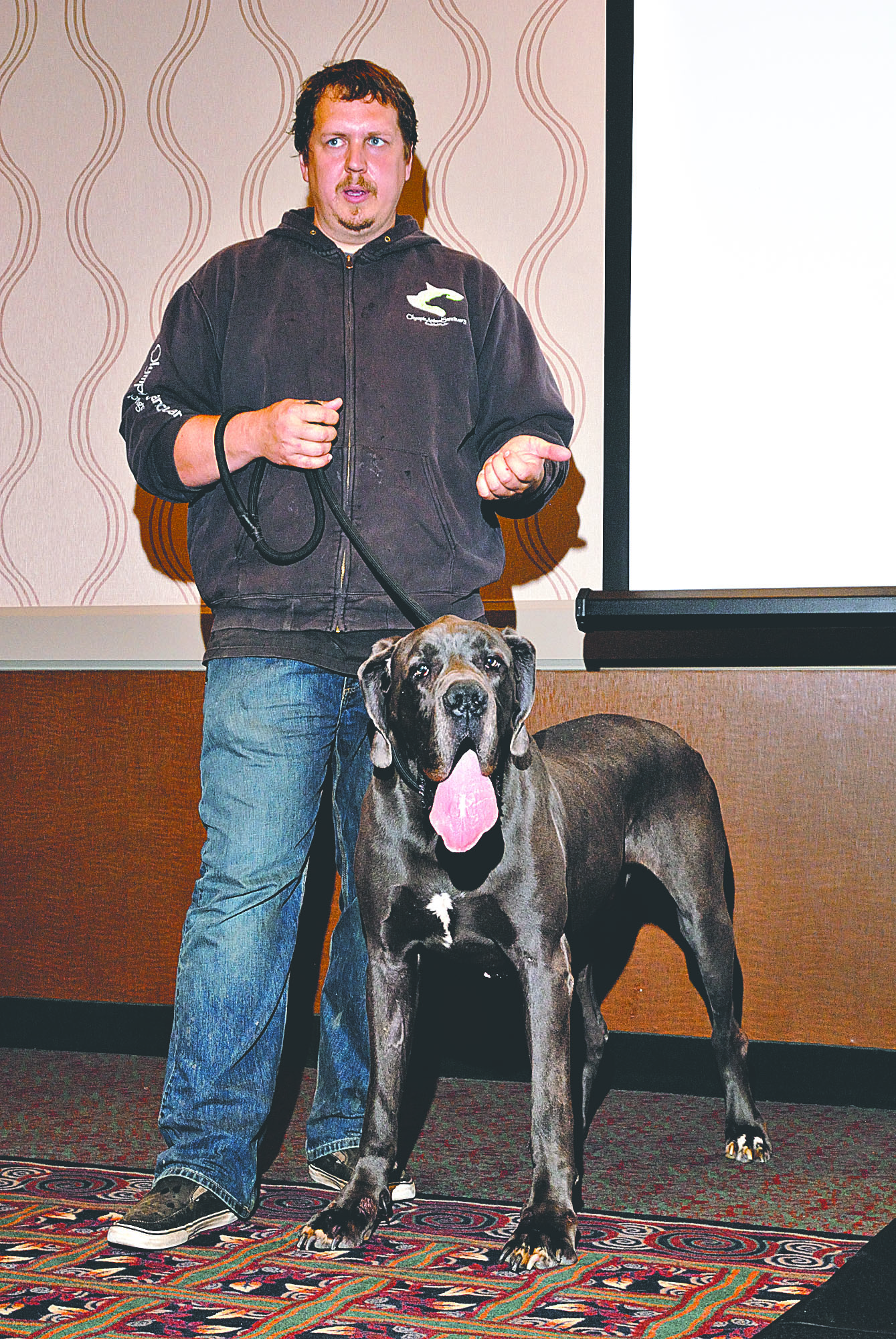PORT ANGELES — The Olympic Animal Sanctuary in Forks is special — the only one of its kind in the U.S., and possibly the world — founder and trainer Steve Markwell said in a presentation to the Port Angeles Regional Chamber of Commerce’s weekly luncheon Monday.
The sanctuary, he said, is home to more than 130 dogs from across the country.
Most of the dogs, which had been labeled as “dangerous” or “vicious” by a city or county agency, were rescued from almost certain death, Markwell said.
Some, he said, are a danger to people, and some a danger to other dogs.
But a few, he said, aren’t dangerous at all and can be adopted.
No matter the dogs’ histories, though, they don’t deserve to be killed for humans’ mistakes, he said.
Markwell, 37, originally from Orange County, Calif., has taken on cities and even state governments to save dogs he thinks deserve to live.
He will drop everything and drive to the East Coast to pick up a dog — with 48 hours’ notice, said Matthew Randazzo, spokesman for the sanctuary.
Markwell worked with big cats and bears in Colorado and California before coming to the North Olympic Peninsula, which gave him insight in working with the dogs, he said.
Randazzo said the most challenging cases end up at the Olympic Animal Sanctuary.
“He takes dogs no other animal sanctuary will take.”
Markwell and Randazzo brought two dogs to the chamber luncheon.
Alex, a German shepherd rescued from a Sequim yard six months ago, had been chained to a doghouse most of his life, and even his owner could approach him, Markwell said.
Once the dog was off the chain, all he wanted was to be petted, to be close to people, he said.
The transformation took under two hours, Markwell said. Today, Alex shows signs of having high-level training at some point in his life.
Off-leash, the shepherd eagerly follows complex commands, but on-leash he pulls his handler around like a dog sled.
“Alex is a sweetheart, but his leash skills are absolutely lousy,” he said.
Being on a chain makes a dog feel vulnerable — it can’t run away from a threat, he explained.
“When you take that away from them, all you have left is fight,” he said.
A full 20 percent of the dogs at the sanctuary had been chained.
Juno is one of two Great Danes to come to the sanctuary. The other, a female, died of cancer.
The dogs had been accused of killing a third dog, Markwell said.
He said he sees no sign of that kind of behavior in Juno. But the big dog, labeled for life as vicious, can never be outside without a muzzle and must live in a cage — sentenced to a life in canine prison.
He does, however, get love and attention from volunteers, and is allowed out in an exercise yard.
At 150 pounds, Juno is the biggest dog at the shelter, but his playmates are members of two other giant breeds — Great Pyrenees and St. Bernard.
The smallest dog at the shelter is a 7-pound toy poodle, which almost killed its elderly owner after she refused to let the dog lick the dishes, he said.
Two are pit bulls, while nine are American Eskimos — products of a puppy mill.
The sanctuary also has several wolf-dog and coyote-dog hybrids.
The wolf hybrids are outside in the run all night, to do what their wolf heritage wants them to do — play as a pack all night.
The coyote hybrids sleep with Markwell.
“There’s nothing like waking up to having your feet bitten,” he said.
Markwell wants to move the shelter out of Forks and closer to Port Angeles, he said. Forks is far from the volunteers, and too far to shuttle supplies regularly.
The organization, a 501 (c)3 registered nonprofit, is always accepting donations.
Last year, the shelter’s budget was $130,000, Markwell said.
That doesn’t go far with a $1,300-per-week food bill and $1,000-a-month veterinary bills.
Not to mention trips to the East Coast.
Donations can be made at www.olympicanimalsanctuary.org.
Information and updates on the sanctuary dogs can be found at www.facebook.com/olympicanimalsanctuary.
________
Reporter Arwyn Rice can be reached at 360-452-2345, ext. 5070, or at arwyn.rice@peninsuladailynews.com.

